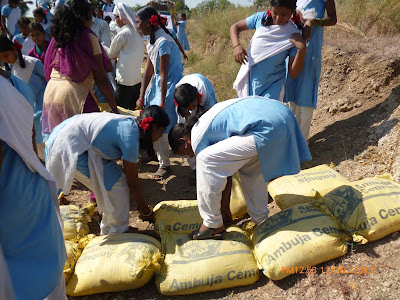Environment Service Scheme
The Environment Department, Government of Maharashtra has
initiated in 2011 a new scheme called Environment Service Scheme (ESS) for Secondary and Higher Secondary Schools in the state. The
objective is to provide students an opportunity to explore and understand their
local environment and natural resources, and undertake hands-on
activities and action projects for local environmental improvement and
conservation. An ESS unit is expected to identify a 3 hour weekly slot
for these activities and projects.
The scheme is currently being implemented in 50 schools
in 12 districts of Maharashtra, i.e. Nagpur, Chandrapur, Amravati, Yavatmal,
Jalna, Aurangabad, Jalgoan, Nashik, Pune, Solapur, Ratnagiri and
Thane. Selected schools have identified teachers in charge and made an ESS unit
of 50 students. A number of partner NGOs have also been
identified who would support the schools with their knowledge especially in the
conduct of action projects.
The photo essay page provides a glimpse into the eco-club
activities. For more information write to ess@ceeindia.org
 |
Students from Somalwar High School, Khamla, Nagpur,
interviewed vegetable vendors’ to understand the use
of polythene bags, disposal of vegetable waste and
alternatives for polythene bag use.
|
 |
Students of Dnyanjyot Madhyamik Vidyalaya, Jalna
visited Krishi Vigyan Kendra to understand the concepts
of soil sampling, plantation, vermi-composting etc that
provided useful inputs for school activities.
|
 |
Students of Janata Vidayalya, Dindori, Nashik, made
a detailed resource map of their village by documenting
the village boundaries, river,road, streams,
agriculture land, forest, water bodies, hills etc. |
 |
Students of Shashank Madhyamik Vidyalaya,Thane,
engaged in a survey to understand the water, sanitation and waste management concerns of slum residents. |
Photograph Courtesy: Bhimashankar Dhale, Joeb Dawoodi, Jagdish Thakur, Supriya Nishandar, Nandkishor Dudhe, Ganesh Satav








